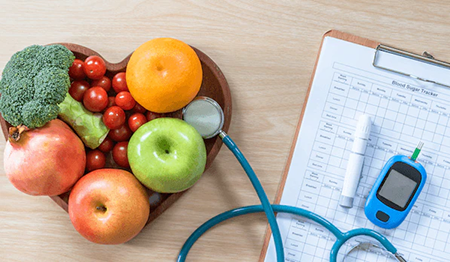Whether you have Diabetes or not, here are some helpful nutrition and lifestyle tips

Diabetes Education Specialist, Oak Orchard Health
Let us start by talking about diabetes since I am a Diabetes Educator, at Oak Orchard Health and have been a registered nurse and dietitian for 15 years. Much of this information will be helpful whether you have diabetes or not. I will also discuss nutrition tips that are helpful to everyone.
Two main types of Diabetes
With type 1 diabetes, genetics and viruses are often the main reasons why people get this. With type 1 diabetes, your own immune system destroys the cells that produce insulin. This is a problem as no one can live without insulin. Insulin is key to helping our bodies obtain energy. Type 1 diabetes most often affects younger people, but it can also be found in people in their 30s-40s and even older.
Most people with diabetes have type 2 diabetes; some risk factors include family history, age above 35, and high blood pressure. Two main things are going on with type 2 diabetes. Your insulin doesn’t work the way it should and over time, you may not make enough insulin. Both these factors make it difficult for your body to obtain energy and lead to high blood sugars.
What does weight have to do with it?
Two risk factors found in many people with type 2 diabetes are also very common among people living in America today. You guessed it! Being overweight and inactive. Per the CDC 73.6% of adults and 22% of adolescents are overweight/obese. Physical activity stats are not much better. Only 23% of adults are meeting the physical activity guidelines, which is very similar to our younger folks.
Just having a diagnosis of diabetes puts you at increased risk of heart disease. Not surprisingly being overweight/obese also places you at higher risk.
What you eat helps control diabetes
Eating heart-healthy foods is one of the key tools to managing your diabetes. It also is effective for disease prevention. There is no diabetic diet currently endorsed by the American Diabetes Association. Overall, your nutrition plan should be individualized, so it fits within your lifestyle. Yes, it is true carbohydrates do affect your blood sugar more than other nutrients. However, carbs are your main source of energy for your body. So, what is a person with diabetes supposed to do? Include healthy carbs, spread your intake of carbs throughout the day, pay attention to the portion size, and have balanced meals.
For diabetes, we often review the meal planning method called carb counting. In this plan, you learn what foods are high in carbs, and what is a portion, and then learn to have a consistent amount at each meal. By following this type of plan, you will have blood sugars that are more predictable. Another type of plan commonly used is called the plate method. It is based on a 9-inch plate. Half your plate should include non-starchy veggies, ¼ is for starch and ¼ is for protein.
For people on insulin pumps or 3-4 injections of insulin per day, some learn how to adjust the insulin to the number of carbs they will eat. This gives people much more flexibility in their eating habits.
Carbohydrates are not necessarily bad for you
For everyone out there, carbs are not bad, just like fat and protein are not bad if eaten in moderation. They make up our nutrients and nutrients are what we all need to live on. It is true; however, if you have diabetes, it is important to pay attention to the number of carbs you eat. Instead of eliminating an entire food group, work on including a variety of heart-healthy food choices most often and limit your intake of less healthy ones. With diabetes, you can really have your cake and eat it too! Just do not eat the whole cake whoever you are!
This article gives you a peek at diabetes and nutrition. There is so much more to know so if you have questions, talk with your primary care physician or a diabetes educator.







































































